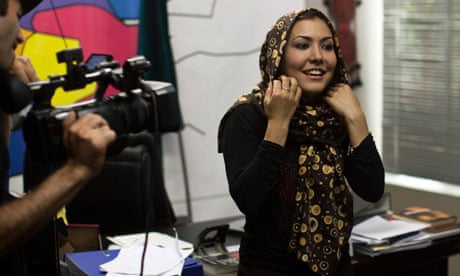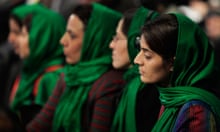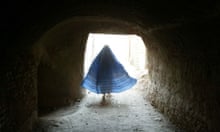Even after the taunts and threats for appearing on TV, and whispered criticism of "immodest" outfits, the attack on actor sisters Areza and Tamana, and their friend Benafsha, came as a surprise.
The trio were minutes from moving out of a neighbourhood in which conservative locals had made them feel unwelcome, walking to meet a minivan full of their possessions, when six men surrounded them in a lane, lined with high-walled compounds. They left Benafsha bleeding to death outside a mosque with stab wounds, and the injured sisters desperately seeking help.
"I didn't see the TV programme, I just heard the local boys saying that one of them played a role with boys," said Yaqin Ali Khalili, owner of a shop that the women frequented. "The hatred of the people here is the reason she was killed, I am 100% sure," he added.
Word travels fast in Kabul, and in a couple of days other actresses were being intimidated. One prominent young actress, Sahar Parniyan, received death threats and has gone into hiding. On the rare occasions she still ventures out she has to wear the burqas she used to despise. "The threats were in calls at midnight, or 2am when I was deep asleep, using very bad words and repeating 'you will be next for assassination'," Parniyan told the Guardian in an interview at a secret location. "I cannot continue my life as an actress in Afghanistan, although I love my job. The Taliban are against women, but so are other groups … Afghanistan is not made for women, whether actresses or not."
The killing and death threats have fuelled fears that conservative pressures are shrinking opportunities for women in public roles.
Tamana had performed in the Emrooz television show, which sparked the most recent abuse, and her sister Areza had taken at least one small role, using the screen name Sadaf, in a popular satirical series, The Ministry, in which Parniyan also acts, according to its director. But although they survived the assault that killed their friend, they are now awaiting another kind of punishment.
After a few hours in hospital for treatment, they were taken to prison, where they face intrusive virginity tests and possible charges of prostitution or collusion in the attack. "We have already sent them to the forensic office to do an examination, to make clear whether these girls are having illegal relations with anyone," said prosecutor Ghulam Dastegir Hedayat, responsible for western Kabul, where the killing took place.
Acting is controversial for women in Afghanistan, tied up in many minds – as it once was in the west – with prejudices. "She was quite silent, but a good girl," Parniyan said of Areza, whom she met during filming for The Ministry. "In the eyes of society though, she was a bad girl, and I am a bad girl too."
Perhaps because of this, the sisters hid their part-time careers. "They told us they did laundry in the city. We didn't know they were actresses," said Nasreen Amaninejad, mother of the family who rented them the room in Karte Seh. But the three women were vulnerable without any known male relatives. The sisters are orphans from the north. Benafsha was divorced and had apparently severed contact with her birth family, and the one she married into. No one has been in touch about her death, police and prosecutors say.
"Women living in a house together without male relatives is very unusual and the police and neighbours all seem to imagine that in a situation like that they are running a brothel," said Heather Barr, Afghanistan researcher for Human Rights Watch. "We came across quite a few cases where behaviour that the police didn't approve of seems to have turned into a crime and a long prison sentence. And certainly any woman who is not under the control of or vouched for by a husband or male family member is deemed immoral."
The sisters, instead of seeing their attackers jailed, may face years in prison for "moral crimes". While police and prosecutors claimed the women were not attacked for being actors, they suggested the assault was prompted by their work and living arrangements. "The result of our investigation is that she was not killed because they work in television, the six people who killed her were threatening the group one or two days before with the aim of getting them to agree to illegal relations," said Hedayat, the prosecutor.
A senior police officer involved in the case also believed the women were probably attacked for refusing sex, and pointed to their lack of education as evidence they were prostitutes – even though he is a commander in a force where more than three-quarters of new recruits are illiterate. "To feed themselves they have to find money. Where do they get it from?" said the officer, who spoke on condition of anonymity. "This wasn't a people's attack on them, it was just something between some groups and the women … when there is a request to the females and they refuse, this kind of thing happens."



